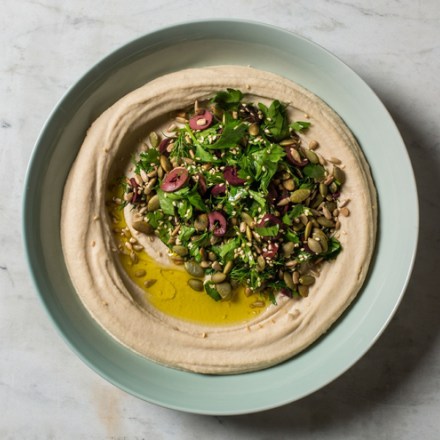Ingredients
| 3 g | plus 6 g kosher salt, divided |
| 1 g | baking soda |
| 1,800 g | plus 75 g water, divided |
| 250 g | white tepary beans, picked over and rinsed |
| 125 g | plus 10 g lemon juice, divided |
| 20 g | garlic (4 cloves), unpeeled |
| 165 g | tahini |
| 1 g | ground cumin |
| 80 g | kalamata olives, pitted and sliced thin |
| 25 g | plus 25 g extra-virgin olive oil, divided |
| 10 g | fresh parsley, chopped coarse |
| 5 g | fresh dill sprigs, chopped coarse |
| 20 g | pepitas, toasted |
| 20 g | sunflower seeds, toasted |
| 20 g | white sesame seeds, toasted |
| 1 teaspoon plus 2 teaspoons kosher salt, divided |
| ¼ teaspoon baking soda |
| 8 cups plus ⅓ cup water, divided |
| 1¼ cups white tepary beans, picked over and rinsed |
| ½ cup plus 2 teaspoons lemon juice, divided |
| 4 garlic cloves, unpeeled |
| ⅔ cup tahini |
| ¼ teaspoon ground cumin |
| ¾ cup fresh parsley, chopped coarse |
| ½ cup fresh dill sprigs, chopped coarse |
| ½ cup kalamata olives, pitted and sliced thin |
| 2 tablespoons plus 2 tablespoons extra-virgin olive oil, divided |
| 2 tablespoons pepitas, toasted |
| 2 tablespoons sunflower seeds, toasted |
| 2 tablespoons white sesame seeds, toasted |
Essential Equipment
Instructions
- 3 g kosher salt
- 1 g baking soda
- 1,800 g water
- 250 g white tepary beans, picked over and rinsed
- 125 g lemon juice
- 75 g water
- 20 g garlic (4 cloves), unpeeled
- 6 g kosher salt
- 165 g tahini
- 1 g ground cumin
- 80 g kalamata olives, pitted and sliced thin
- 25 g plus 25 g extra-virgin olive oil, divided
- 10 g lemon juice
- 10 g fresh parsley, chopped coarse
- 5 g fresh dill sprigs, chopped coarse
- Kosher salt
- 20 g pepitas, toasted
- 20 g sunflower seeds, toasted
- 20 g white sesame seeds, toasted
Toss olives, 25 grams oil, 10 grams lemon juice, parsley, and dill together in small bowl. Season with salt to taste. Transfer hummus to large, wide serving bowl and use back of large spoon to spread hummus up sides of bowl, leaving well at center. Place herb salad in center of well. Sprinkle pepitas, sunflower seeds, and sesame seeds over top and drizzle with remaining 25 grams oil. Serve with pita bread or pita chips.
Instructions
- 1 teaspoon kosher salt
- ¼ teaspoon baking soda
- 8 cups water
- 1¼ cups white tepary beans, picked over and rinsed
- ½ cup lemon juice
- ⅓ cup water
- 4 garlic cloves, unpeeled
- 2 teaspoons kosher salt
- ⅔ cup tahini
- ¼ teaspoon ground cumin
- ¾ cup fresh parsley, chopped coarse
- ½ cup fresh dill sprigs, chopped coarse
- ½ cup kalamata olives, pitted and sliced thin
- 2 tablespoons plus 2 tablespoons extra-virgin olive oil, divided
- 2 teaspoons lemon juice
- Kosher salt
- 2 tablespoons pepitas, toasted
- 2 tablespoons sunflower seeds, toasted
- 2 tablespoons white sesame seeds, toasted
Toss parsley, dill, olives, 2 tablespoons oil, and 2 teaspoons lemon juice together in small bowl. Season with salt to taste. Transfer hummus to large, wide serving bowl and use back of large spoon to spread hummus up sides of bowl, leaving well at center. Place herb salad in center of well. Sprinkle pepitas, sunflower seeds, and sesame seeds over top and drizzle with remaining 2 tablespoons oil. Serve with pita bread or pita chips.
